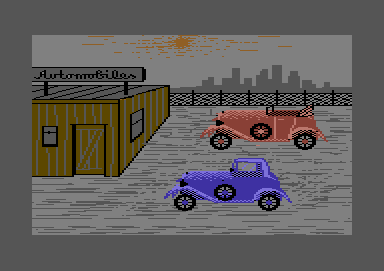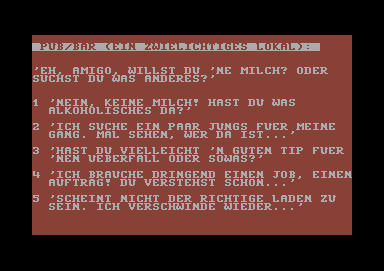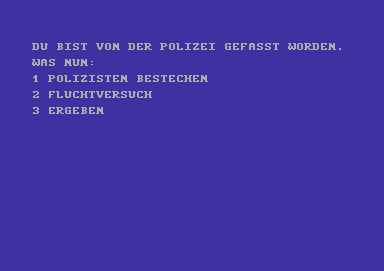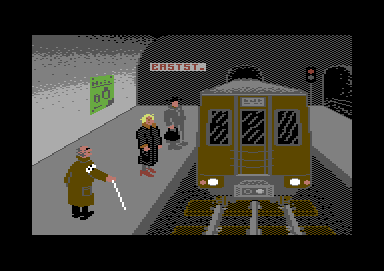Retro Replay Review
Gameplay
Mafia’s gameplay weaves strategic decision-making with a turn-based structure that demands both patience and planning. Each turn represents one month in 1920s Chicago, giving you a limited number of steps based on your chosen mode of transportation—whether you’re hoofing it across town or speeding in a stolen car. You’ll spend most of your time exploring the city, entering buildings, and choosing from multiple-choice menus that determine the success or failure of crimes, blackmail attempts, and business deals.
(HEY YOU!! We hope you enjoy! We try not to run ads. So basically, this is a very expensive hobby running this site. Please consider joining us for updates, forums, and more. Network w/ us to make some cash or friends while retro gaming, and you can win some free retro games for posting. Okay, carry on 👍)
Your character’s attributes—Energy, Strength, Intelligence, and Brutality—play a crucial role in shaping your criminal career. A higher Intelligence raises your odds in complex heists, Brutality unlocks more powerful weapons for combat, and Strength affects your stamina during police chases or hand-to-hand fights. Balancing these stats through training in weapon stores or recruiting trainers is vital; neglecting one attribute can leave you vulnerable in high-stakes missions or gang wars.
Crime options range from simple store robberies and pickpocketing in subway cars to elaborate bank heists that require careful team coordination. As you climb the ranks, the risk increases but so do the rewards—more lucrative targets open up, shopkeepers cower more easily, and you gain valuable intelligence on upcoming scores. Recruiting up to ten gang members adds another layer of strategy: you decide who accompanies you into combat, who stays behind to guard assets, and who handles logistics like bribery and protection.
Combat itself is a turn-based mini-game viewed from a top-down perspective. Whether you’re facing off against police squads or rival gangs, each turn allows for a single move or an attack. Victory boosts your reputation and bankroll, while defeat might mean jail time, loss of points, or the need to bribe your way out. Multiplayer “gang wars” introduce competitive elements, letting up to four players vie for criminal dominance in the same city, which keeps Mafia compelling even after the single-player campaign wanes.
Graphics
For its era, Mafia delivers surprisingly atmospheric visuals that transport you straight into the speakeasy-strewn streets of 1920s Chicago. The top-down city map is rendered with enough detail to distinguish storefronts, alleys, and transportation hubs, while building interiors boast period-appropriate furnishings and signage. The muted color palette—dominated by sepia tones and early-film blacks and whites—heightens the feeling of living through the Prohibition era.
Character sprites and vehicle models may appear simplistic by modern standards, but they do an excellent job of conveying the distinct roles and statuses within the criminal underworld. Police officers in crisp uniforms, rival gangsters in pinstripe suits and fedoras, and the ever-present patrol cars and steam-driven locomotives all contribute to a convincing historical backdrop. Animation is functional: guns fire with a satisfying flash, and car chases feature enough movement to keep the tension high.
Combat maps, though small in scale, offer tactical variety. Barricades, crates, and parked cars can be used as cover, adding a chess-like layer to each firefight. The transition from the overworld map to these combat arenas is smooth, ensuring the flow of play remains uninterrupted. Even low-resolution textures and simple shading don’t detract from the overall immersion; instead, they reinforce the game’s noir aesthetic.
Sound design also complements the visuals, with period-appropriate jazz and ragtime tracks setting the mood in bars and casinos, and tense orchestral swells underscoring high-risk heists and police encounters. Though there’s no voice acting, the ambient noises—shouting shopkeepers, clinking glasses, and the distant wail of sirens—fill in the gaps, making the city feel alive and reactive to your criminal exploits.
Story
Mafia’s narrative casts you as a small-time hood tasked with climbing the ranks of the underworld to become its undisputed boss. What begins as petty theft and speakeasy smuggling gradually escalates into high-profile bank robberies and gang wars. The writing captures the taut atmosphere of Prohibition Chicago, where every corner could hide an opportunity or an ambush, and loyalty is as fleeting as a newspaper headline.
Character development is handled through the crimes you commit and the relationships you forge. As you earn respect from other criminals, shopkeepers tremble at your name, and police informants start whispering vulnerabilities. Recruiting gang members gives you a personal stake in the narrative—these are more than nameless NPCs, as their survival in combat hinges on your choices, and their loyalty can turn the tide in especially perilous missions.
Subplots involving underground businesses, corrupt officials, and rival families add weight to your decisions. Bribing the chief of police, forging fake IDs with “Blüten-Eddie,” or establishing your own loan shark operation all feed into a larger tapestry of moral ambiguity. You’re never purely an anti-hero or villain; you’re a product of the era’s desperation and decadence, and Mafia invites you to explore both sides of that coin.
While dialogue is limited by the absence of voice acting, the terse text and situational messages convey urgency and stakes effectively. Whether you’re facing a long sentence in jail or the promise of a multi-thousand-dollar haul, the game’s story beats keep you invested in your rise—and potential fall—from power.
Overall Experience
Mafia offers a rich blend of strategic depth, period charm, and turn-based tactics that stand out, especially for players who appreciate methodical gameplay over twitch-based action. The persistent world of 1920s Chicago feels alive, with every decision echoing through your rise in the criminal hierarchy. As you advance, the city evolves around you: police patrols intensify, rival gangs grow wary, and the stakes become all the higher.
Replayability is baked into the mechanics. Different playstyles—whether you favor brute force, stealthy infiltration, or financial manipulation—lead to distinct experiences. Experimenting with car theft versus legal purchases, or focusing on casino wins rather than outright robberies, ensures that no two playthroughs feel identical. The multiplayer gang-war mode further extends the fun by pitting friends against one another in a race for underworld supremacy.
Mafia’s user interface and learning curve may feel dated to newcomers accustomed to modern open-world or real-time strategy titles, but the payoff is substantial for those willing to invest time in mastering the turn-based economy and combat systems. The lack of real-time suspense is replaced by a more cerebral thrill—outsmarting the police, managing your gang’s morale, and timing your next big heist for maximum profit and minimal risk.
In summary, Mafia remains a standout title for fans of strategic crime simulations and historical settings. Its carefully balanced mechanics, immersive atmosphere, and engaging rise-to-power narrative combine to deliver a criminal saga that’s as challenging as it is evocative. Whether you’re guiding your crew through a daring bank heist or navigating the seedy alleys to recruit that last gang member, Mafia offers an experience that still resonates decades after its release.
 Retro Replay Retro Replay gaming reviews, news, emulation, geek stuff and more!
Retro Replay Retro Replay gaming reviews, news, emulation, geek stuff and more!









Reviews
There are no reviews yet.